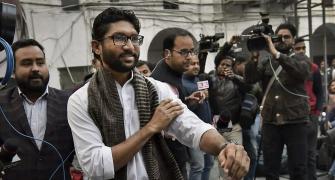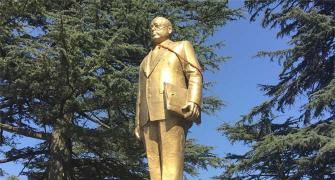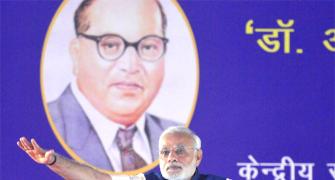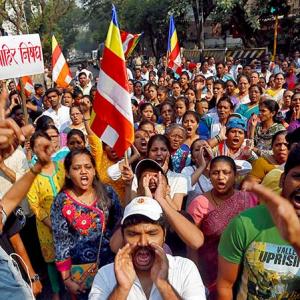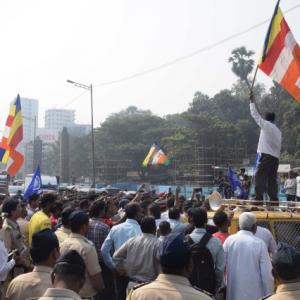'Modi is the first BJP leader to try to include Dalits in its fold.'
'But the rank and file of his party is backward and want to bash up Muslims and Dalits whenever they have a chance.'
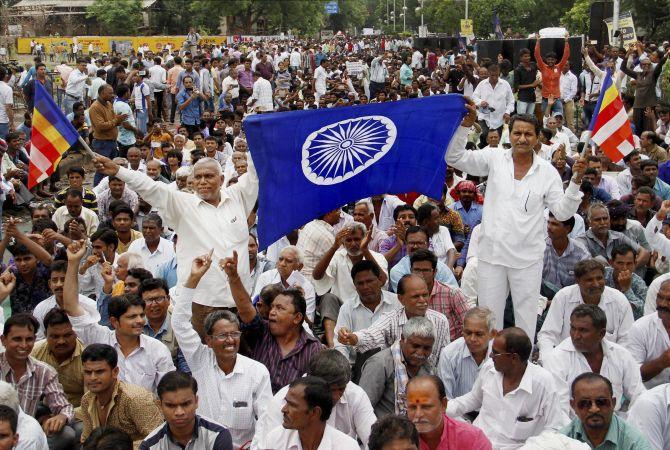
In Raisina Model: Indian Democracy at 70, his new book, the British economist and peer Meghnad Desai discusses the journey the country he was born in has taken so far.
Like many former British colonies, Lord Desai notes, India adopted the Westminster Model, but it 'Indianised it into the Raisina Model'.
"Democracy has kept India united. It does not mean it has no defects nor that it cannot do more," Lord Desai tells Rediff.com's Utkarsh Mishra in an e-mail interview.
Is the success of 'Raisina Model' limited to keeping India united and democratic?
The Raisina Model is, of course, more than that.
The fact is that India is unique in having fashioned a model of liberal democracy which is suited to its own culture and history.
Other ex-colonial nations did adopt the Westminster Model, but few have stayed liberal democracies.
That said, keeping India united and democratic is no mean achievement.

You list some not-so-often-discussed facts about British India: That it was a member of the League of Nations, a member of the Imperial War Cabinet and one of the original signatories of the United Nations Charter.
One is intrigued why independent India was not offered a permanent seat on the UN security council.
Or was it offered, but then prime minister Nehru rejected it as many say?
The five permanent members (of the UN security council) were all principal nation-combatants on the Allied side in the Second World War.
India was then still a part of the British Empire and the Congress had been hostile to the war effort.
The story that India was offered a permanent seat but Nehru declined is most probably true.
India was offered because China had a Communist revolution in 1949. The United States and its NATO (North Atlantic Treaty Organisation) allies did not recognise the People's Republic of China.
The choice was to keep Nationalist China as a permanent member despite its self-exile to Taiwan or admit India.
Nehru refused because he did not wish to unseat China. India was one of the first countries to recognise the PRC.
The Hindu-Muslim debate has hijacked primetime on most television news channels. As you have written that this is mostly a Hindi-belt phenomenon, it is fascinating that regions which suffered the least during Partition harbour such feelings, while border states like Punjab don't.
My guess is that for the Hindi belt states, non-Hindi speaking states do not count.
The fashioning of the narrative of Hindu nation is obsessed about the Delhi sultanate and the Mughal dynasty.
Punjab was until Partition the most integrated state in terms of a syncretic culture.
The Hindutva story of Bharat seldom mentions that part of the Punjab story.
Sikhism is also much more a product of Sufi Islam and Bhakti with little input from Brahmanism (as Hinduism should be called).
You write that 'it was Hindu society with its iron frame of the Varna system, with Brahmin domination, which kept India together'.
But even after the Brahmin hegemony was shattered, the Dalits or other lower castes never actually sought a separate country for them on the lines of Pakistan.
What is coming out in stories such as Bhima Koregaon is the positive part played by the British in raising the status of sections of the Dalits, whom they recruited in the army.
Dalits could also go to school once the British offered education.
The idea that minorities should demand a nation for themselves did not develop till after the First World War, when the Austro-Hungarian empire broke up into constituent nations such as Hungary, Czechoslovakia etc.
There was a surge in nation formation and the ideology of locals versus foreigners (people who had always lived there but spoke a different language) in each separate State.
It was this idea of primordial nationalism that (Mohammad Ali) Jinnah developed.
Dalits were scattered across the country. Muslims had concentration in the north west and Bengal.
Everywhere else such as the Hindi belt they were in a minority. But these were the populous Hindi belt states. Thus, a majority of Muslims in pre-Partition India lived in Muslim minority states while a minority lived in Muslim majority states!
Dalits were not concentrated in any one region. But also the Hindu politicians especially (Mahatma) Gandhi but (Vinayak Damodar) Savarkar as well fought for Dalit uplift because they wanted to include the Dalits within the Hindu fold.
Gandhi's Yerawada fast was very much a ploy for keeping Dalits into the Hindu voting group.
Ultimately, (Dr B R) Ambedkar left Hinduism, but not India.
How do you see the present consolidation of Dalit and minority groups against the government, calling it the 'neo Peshwas'?
That is a local Maharashtra quarrel. The Peshwas were Chitpavan Brahmans unlike the Shivaji dynasty, who were at best Kshatriyas.
So calling someone new Peshwai is to associate them with the elite culture against OBC-Dalit unity.
The Shiv Sena which has a Maratha image wants the BJP (Bharatiya Janata Party) to be identified as a Brahman party. It is nonsense.
But even before Bhima-Koregaon in January 2018, Dalit anger was palpable in Gujarat, triggered by the Una incident. It was directed against the BJP because the incident was an offshoot of cow vigilantism.
(Prime Minister Narendra D) Modi is the first leader of the BJP to try to include Dalits in its fold.
But the rank and file of his party is backward and want to bash up Muslims and Dalits whenever they have a chance.
This is a big challenge for Modi who never comments on such incidents.
The Dalit vote will split in 2019. In a way, this is an indication of Dalit empowerment as a vote bank.
You write that the reason the Raisina Model was successful in keeping India united was democracy. But why did democracy survive in this land -- with only a brief hiatus during the Emergency?
And how successful was that democracy, as you also point at legislation like the anti-defection law and control of party whips over opinions and votes of law-makers?
I frankly don't understand what the question is about except that it wants to raise an objection for the sake of it.
Democracy survived despite the Emergency because India does not have a dominant linguistic or caste community.
Sri Lanka had the Sinhala majority which tried to downgrade the Tamil minority and paid a price in terms of a 25 year civil war.
Pakistan tried to suppress the Bengali-speaking Muslim majority of East Pakistan and paid the price.
Even the Hindi belt, though united, is not large enough to dominate India.
Let me repeat, democracy has kept India united. It does not mean it has no defects nor that it cannot do more.
The anti-defection law is a problem to be solved, but it was part of the search for stability.
Giving the example of leaders like Kanshi Ram, who harnessed political power to get the voices of oppressed people heard, you write that 'political stability in terms of single party majority was not desirable for every group'.
You say such 'stability reinforced elite rule'.
But you also write that a strong government at the Centre is necessary to take radical reforms.
Is this what is happening right now, that the strong central government is willing to take up reforms but the interest of the lower classes is being ignored?
I do not agree that the present government is ignoring the interest of the lower classes. It is led by an OBC. It plays up its pro-Dalit stance. It is desperate to help farmers.
Kanshi Ram was speaking of a single upper caste-led hegemonic party -- the Congress for short -- which he did not want revived.
Even now, the BJP has a razor thin majority as a single party (273 at the last count).
Coalitions are what he wanted preferably without single party dominance. That continues to be the case.
That is the Raisina Model.

You say that India took a 'wrong economic path' by ignoring agriculture and concentrating on heavy industry at the beginning.
Also, the private sector was largely ignored while the PSUs were favoured.
But we see that post the liberalisation of the economy, income inequality has dramatically increased.
Moreover, farmer suicides have also increased since the last 20 years.
Income inequality has increased across the world in almost every country.
India's inequality measure is much below countries like China in terms of the Gini coefficient. Of course, the income data are dubious in all countries so these Gini measures are full of measurement errors.
Farmer suicides are a result of the wrong policies chosen.
As I say, in other countries, rural population moved to urban areas to work in manufacturing.
In India manufacturing did not create jobs as it was capital intensive.
The result is that India has rural overcrowding.
Eighty per cent of the farms are subsistence size farms where a single bad monsoon is serious. It is the failure to move the rural people to urban jobs which is the root cause of agricultural distress.
Farm loan waivers just exacerbate the problem by keeping these poor farmers on the land.
Do you now see the Hindu nationalist 'idea of India' winning over the other ones?
You say it is limited to the Hindi belt and Gujarat and Maharashtra and 'it will not take Assam, Orissa or Kerala along'
But now several north eastern states have BJP governments.
The short answer is no. The BJP may or may not win a state, but that does not convert it into a Hindi belt state.
The culture is different between the Hindi belt and even Bengal, or Punjab which are neighbours.
As I say, each linguistic area is a nation. Hinduism itself has many hues across the country despite the attempt to semitise it as one God, one Book, one language religion.
What is more, the BJP may win, but it may also lose. This is what Gujarat and the recent by-election results in Rajasthan signal.

